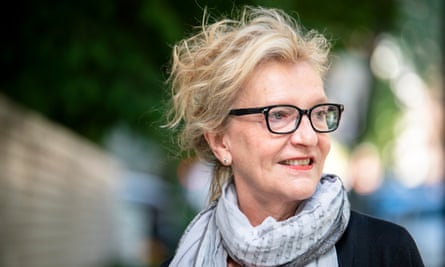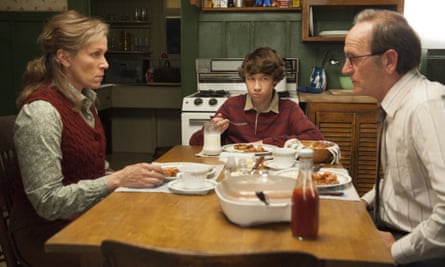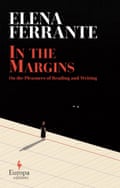Dear Elena Ferrante,
Thank you for all of your work. I am a huge fan, and I have read all your books, and by reading them I was able to take new risks with my own work. So thank you for that as well. In this new book you go deep, deep into the things that matter for readers and writers alike. I am very glad to be in a conversation with you about it.
To write about artistic mystery is as mysterious as the art itself but in your new book, In the Margins, you give an amazing depiction of what has driven you and how you have evolved as a writer. What a fascinating read it was, all the way to the exalted end with Dante and Beatrice. How different is it to write a book like this one, as opposed to writing one of your pieces of fiction? Are you more conscious of trying to “stay in the margins”? And yet it seems to me this book also excites itself to a high pitch.

In your first essay/lecture you twice describe yourself as timid, but your work is extremely brave. I assume this is because the “I” that you describe as timid or lacking courage disappears and becomes many other “I”s as you write. You quote from a conversation between Virginia Woolf and Lytton Strachey. He asks:
“And your novel?”
“Oh, I put in my hand and rummage in the bran pie.”
“That’s what’s so wonderful. And it’s all different.”
“Yes, I’m 20 people.”
You also speak of this directly when you say that the “excited I” had not written a story “but another I, tightly disciplined”. Can you explain these different “I”s a bit more?
I think – I don’t know – that we all experience this. In acting class when I was 16, the teacher spoke of the different “I”s we all have, and this was the first time it had been named for me. It was (quietly, privately) very liberating.
I’m glad you referenced how Virginia Woolf puts in her hand and “rummages in the bran pie”, as she writes a novel. For many years I had a sense of myself when writing, as placing my hand in a big box and trying to feel the shapes but I could not see them, I could only feel them as I tried to arrange them. Have you had any image of something like this for yourself, or does Virginia Woolf’s bran pie do it for you?
You write: “For me true writing is that: not an elegant, studied gesture but a convulsive act.” I’m really interested in the two kinds of writing you describe in that first lecture. The writing that stays inside the margins, and the writing that becomes, as you say, “almost a convulsive act”. Can you tell us just a little more about when this transformation comes in the writing itself?
Dear Elizabeth,
Thank you for your kind words about In the Margins. I really loved your novels Amy and Isabelle, The Burgess Boys, and naturally the amazing Olive Kitteridge.
But, I must tell you, I value your opinion of In the Margins especially because of your novel My Name Is Lucy Barton, or, to be precise, because of the fleeting but memorable relationship between Lucy and the writer Sarah Payne. I like narratives that include the story of the effort of writing, along with the problems that writing involves. Whenever in the vast literary production of today, especially by women, I find a novel with that particular feature I underline the passages that interest me and then put the book on a separate shelf of my bookcase with the intention of returning to it. My Name Is Lucy Barton is there, and I’m happy to make use of it now, during this conversation.

What interested me in the story of Lucy? A double impulse: on the one hand, she doesn’t like those who, as creators of poems or prose or art in general, consider themselves superior to all other human beings; on the other, she assigns an enormous task to the creators of poetry or prose or other artistic forms. It’s a double impulse that I also recognised in myself. I don’t like artists who imagine themselves shamans, and I would prefer that we definitively stop making the alphabet sacred, that we complete the secularisation of literature, that we stop feeling we’re just below the gods and directly inspired by them. This is why – I say this in answer to your questions – I separated the very precarious, uncertain “me” who writes from the other, more solid “mes”, occupied by roles both private and public. I did it in order to feel writing as a function not different from many others – sometimes pleasant, sometimes difficult, sometimes frustrating. And that’s why I so much appreciated your Sarah Payne, the writer, when she says to Lucy: “I’m just a writer.” If I had to develop Sarah’s remark in my own way I would say I’m only one of my “I”s, the “I” that writes: an unstable “I”, which at times exists, often sinks, frequently splits into 20 other people, the 20 Woolf speaks of ironically. One holds my hand in check, one wants me diligent and careful, one digs down bringing unnamable things to light, one erupts unexpectedly – at no precise moment, it could be never – and drags me to name those things, with no regard for anyone or anything.
Even so, of course, that “I” may seem a manifestation of exceptionality, if a painful one. In fact, like you, I felt different as a child. I was nearly mute, or expressed myself in timid monosyllables. But then my moment arrived and it seemed to me that I lowered a bucket into my head and pulled out words. The words carried a story with them. The more the story advanced, and the wilder the pace of the bucket as it went up and down, bringing me pleasure and unease, the more enthralled the other children were. But was I really different? No. Just think of when, in ordinary conversation, we proceed in disjointed phrases, either weighing our words or using an ironic tone that drives out a melodramatic one. Then, unexpectedly, suddenly, something breaks through the margins and speech becomes a flood, liberating, moving, passionate, fierce, until we’re embarrassed, we’re sorry, we say: I don’t know, something got into me. Well, that something – an “I” crouching in our brain – grabs us and tears us away from a prudent or calculating “I”, dragging us along, imposing its rhythm: it’s a common experience for us all. We know it, whether we’re writers or not.

Of course, it’s different when it happens in writing, but all the more reason to need unexpected breaches of the margins. It’s the undisciplined eruptions of truth that, when we have grand ambitions, motivate our writing. Lucy Barton justly sets a very high goal for herself, saying: “I will write and people will not feel so alone.” Sarah Payne is her equal, saying: the job of “a writer of fiction [is] to report on the human condition”. Both Lucy and Sarah emphasise: you have to write the truth, without protecting anyone or anything; you have to strip yourself of any judgment, understand the other by getting to the depths. But here the second impulse I mentioned earlier appears: with the claim of superiority set aside, with self-deification set aside, Lucy and Sarah and all of us who have a passion to write nevertheless take on ourselves the old task with sensitivity and intelligence, with specialised knowledge, and with an extremely high rate of failure.
Is it too much for us ordinary people, who no longer feel the solidity of the great authors of the past but are, instead, fragmented into many “I”s? Does the arrogance of the writer’s role, pushed out through the door, necessarily come back in through the window? Along with the “I” that makes poetry or prose or art in general, should our ambitions be reduced, and will writing become – has it already become – a transcription of trite facts?
A person I love said to me long ago: “Although you writers today behave with humility, deep down you can’t accept the idea that you aren’t omniscient, that you aren’t the prophets of some god – you still think your stories can encompass a world that not even a team of specialists can explain. Resign yourself: if you like, and if people read you, you’ll become part of a sector – a fairly irrelevant one, among other things – of the enormous entertainment industry.” At the time I didn’t know how to respond, today I know but in a confused way. I’d like to hear what you have to say. You’ve written powerful books and maybe your ideas are clearer.
Hello again Elena,
What came to mind immediately as I read your question to me was the poem by Emily Dickinson “I’m Nobody! Who Are You?”:
I’m Nobody! Who are you?
Are you – Nobody – too?
Then there’s a pair of us!
Don’t tell! they’d advertise – you know!
How dreary – to be – Somebody!
How public – like a Frog –
To tell one’s name – the livelong June –
To an admiring Bog!
“To tell one’s name … ” (How I admire you for keeping your name to yourself.) But this poem is so fresh, so innocent in a way. And those first few lines I think have always stayed with me since I first heard them as a very young girl, because that is how I feel – happily, that is how I feel. I’m Nobody!
I think that very few people understand this about me; I have been (I believe) accused of false modesty, and yet it is not false, and it is not modesty. It is simply that when I write – the me that people see, the person people think I am – just disappears and I become the text itself. And when I emerge, my sense of that original me goes back to being Nobody. This is hard for people to grasp.

My own understanding of this is that such a thing came from my very puritanical New England background, which insisted that one never call attention to themselves. (Even today when someone asks my mother if she is proud of me, she will say, “No, why should I be proud of her?” And I actually understand her answer.) And yet I think it is more than the cultural heritage I was raised with. I really feel almost that I have no self – even as I know that I do. (I remember when I was a teenager my mother asked me one day with great irritation, “Why can’t you just be yourself?” And what I did not say but thought was: But I am so many selves.) And yet here I say I am Nobody. Because I am. But I am aware that this is not entirely the truth. But it is not false either. And therein lies the rub.
The person you love who spoke to you about writers feeling omniscient – what interests me is the phrase, “you still think your stories can encompass a world that not even a team of specialists can explain”.
Frankly, I would like to think that was true. That writers do exactly that, “encompass a world that not even a team of specialists can explain”. Otherwise, why am I doing it? (I am speaking for myself here.) If it can be explained some other way, then let it be. But I want to believe that what I write cannot be explained any other way than through the story that I am telling.
This implies that I am very ambitious, that I am working from that Lucy/Sarah starting point of thinking I can do it. And that is true. Although I never know if I can do it, and I frequently fail. But the I who am Nobody and the ambitious person (me) who tries to put something down on paper that cannot be explained by a team of experts – Well, both are true, being Nobody and ambitious at the same time; there we are.
But when you ask, should our ambitions be reduced, and will writing become – has it already become – a transcription of trite facts? I say very strongly, No! We should not reduce our ambitions, and writing – dear God, I hope my writing – never becomes a transcription of trite facts!
Here is what I believe: it is the pressure between the lines of the text, and the pressure rising up from under the text, and the pressure that is running above the text, that gives the writing its meaning, it is the unwritten sitting right next to the written, which makes something go beyond the explanation of the team of experts. And this is what happens when you go outside the margins (if I understand you correctly) and it is this which is mysterious, that we aim for.
You say your loved one said, “Resign yourself: if you like, and if people read you, you’ll become part of a sector – a fairly irrelevant one, among other things – of the enormous entertainment industry.” I am resigned to this. But it is not something I dwell upon. You say, before asking my opinion, that at the time when the loved one first said this to you, you did not know how to respond, but that today, you know, but in a confused way. What is it, in your confusion, you have come to believe about this?
I would like to ask you one more question: In your third essay/lecture in this book you say: “We fabricate fictions not so that the false will seem true but to tell the most unspeakable truth with absolute faithfulness through fiction.” I agree with this entirely. But my question to you now is about voice. I was interested to hear that you had spent time writing in the third person. What is it that you have found to be so liberating about writing in the first person that has allowed you “to tell the most unspeakable truth with absolute faithfulness”? For me, Lucy was her voice. And in your work, the protagonists are their voice. Your ability to play Lila off of Lenù in the Neapolitan novels is a brilliant way to use first person. Can you talk a bit more about this choice of the first person voice, as opposed to writing in the third person?

Dear Elizabeth,
I’m glad your response was so passionate, and I read it with great pleasure and profit. To explain my point of view – not so different from yours, I think – I’ll start with the final question.
Why did I abandon the third-person narrative? I’ll give you a brief answer so as not to bore you. At a certain point, I began to feel that the third person – especially if skilfully used – was a trick. In reality there is no story of the other that is not filtered through an “I”. And a third-person narrative whose narrator is not explicitly present began to seem to me, as I recount in In the Margins, very unconvincing. No matter how love for others and language as an act of love try continuously, insistently, desperately to get outside the margins of the suffocating first-person singular, we remain bodies organically enclosed in our isolation. Once I recognised this, I was convinced that the other can be truthfully described only through an “I” that is colliding and in the collision unravels. And so far, anyway, I haven’t left that battered first person. For me, telling stories is colliding with a passerby – I quote Baudelaire – but refusing to pass by.
Here I will return to your response – which I will have my friend read – and in particular to the Dickinson poem. I love that poem, and I understand in what sense you use the lines. We who write – you say – are no different from ordinary people, with our limited experience as individuals, our historical and cultural roots. And when we start work we get lost in the alphabet, to the point where we coincide with our own text. But – as you stress – that text is and remains highly ambitious, even though we’re not possessed by a demon, even though we’re not oracles, even though we don’t feel we’re Somebody and often don’t even have a desire to become Somebody. Rather – and here it’s I who insist – it’s our own ambitious writing that requires us to set aside the biographically defined “I”. Nobody – Dickinson’s Nobody, who is absolutely different from Odysseus’ clever Nobody – is (I’ll now say what I think) the true name, perhaps, of any woman who writes, since she writes from within an essentially male tradition. We try to use the specificity of writing as best we can (you’ve defined it effectively). We dip into the resources stored in the age-old warehouse of literature. We lower the bucket into our very ordinary brain and pull up words and memory. But they hardly belong to us. Thus, if we’re honest, we’ll go painfully beyond the margins to collide with the other, and beyond the margins search, with outsize ambition, time and again, for our names. But we’re not interested in having a name, in making a name for ourselves; we’re interested in giving a name, in having our writing become truly ours.

The friend I mentioned says: go ahead, at most you’ll contribute to the entertainment industry. I have nothing against entertainment, if it allows me to remain Nobody and continue to be only text. I like Dickinson’s frogs: they are the other, others, and their doings fascinate me. My writing wants to collide with them, dig into them, disrupt them. What’s wrong with rewriting their June choruses from beginning to end? We women are Nobody, but our writing is very ambitious, like – and even more than – Dante’s: he was enormously ambitious and wanted to lose himself in everything and everyone, in order to reach the depths: not coincidentally did he invent verbs of dissolving margins like inleiare, inluiare, intuare, immiare (entering her, entering him, entering you, entering me). Like you, dear Elizabeth, I am for true modesty and true generous ambition. I wish that all women who want to write had a common practice of disruptive writing, which tries to impart a tremor to all forms, and describes that tremor, the chaos it causes, the compositions it decomposes, and the effort of totally redrawing the margins of History and of all stories.
Thank you, hugs, and I hope we’ll have other occasions for conversation.
In the Margins: On the Pleasures of Reading and Writing by Elena Ferrante is published by Europa Editions (£12.99) on 17 March. To support the Guardian and Observer, order your copy at guardianbookshop.com. Delivery charges may apply.
Oh William! by Elizabeth Strout is out in Penguin paperback (£14.99) on 5 May. To support the Guardian and Observer, order your copy at guardianbookshop.com. Delivery charges may apply.
